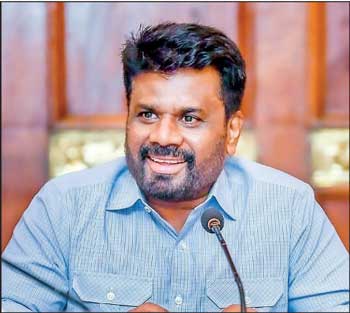Tuesday Feb 17, 2026
Tuesday Feb 17, 2026
Friday, 29 November 2024 00:45 - - {{hitsCtrl.values.hits}}
The Government has already formed a relevant ministry and well-qualified advisers in the field. This is a good positive starting point. The people have yet to see the change in this regard. The NPP Government should also encourage the industries that encourage the creation of jobs, especially for young people, by supporting small and medium-sized businesses (SMEs) and offering vocational training programs. The curriculum of the technical colleges should be overhauled, and relevant job-orientated vocational training should be further developed
 The NPP, which has become a major political force in the most recent Parliamentary election in Sri Lanka, has presented a vision for system change that many people find appealing.
The NPP, which has become a major political force in the most recent Parliamentary election in Sri Lanka, has presented a vision for system change that many people find appealing.
Systems change could be defined as building an environment where social fairness, economic stability, environmental sustainability, and general well-being may flourish. A nation must radically reimagine how its many components interact with one another. In order to achieve the goal of long-lasting improvements in all spheres of society, comprehensive strategies that involve several stakeholders in cooperative efforts are needed. Particularly, people anticipate reforms in politics, changes in the economy, and its growth, which lead to meaningful job creation, debt restructuring, equality, social justice, enhancing educational access to all and infrastructure, empowerment of marginalised communities (such as Muslims, Sri Lankan Tamils, and Upcountry Tamils), sustainability of the environment, anti-corruption initiatives, and others.
Anti-corruption initiatives
Since corruption and malpractices have been major problems in Sri Lankan politics, the NPP has promised to address them directly through initiatives for transparency and strengthening anti-corruption agencies. This should include putting in place adequate systems to make Government procurement and spending procedures more transparent and encouraging the establishment of organisations tasked with combating corruption to function autonomously free from political influence. It appears that procurement of goods and services from overseas has been the major area where corrupt practices existed for the previous ruling party politicians and their allies to make money illegally.
Reform in politics
 |
| The people of Sri Lanka expect the NPP Government to deliver substantial reforms across political, economic, social, environmental, and anti-corruption domains |
The people expect a comprehensive political change aiming at improving democracy and governance. This is one of the main demands made by the people to the NPP Government. It appears that the NPP supports decentralisation of power through the provincial council system. The people from the north have immensely supported the NPP to form the Government by electing many Tamil MPs, which is a turning point in the history of the politics of the Tamils. The Tamil parties from the north, which used Tamil nationalism as a commodity to ‘trade’ and continued to provide false hope and representation in the past, were defeated by the Tamils miserably.
The NPP should now guarantee that decision-making is more representative and sensitive to local interests. The Government can seriously consider the strong argument for giving local governments more authority. For example, school administration, including the appointment and transfer of teachers, school other resource allocation, etc., can be decentralised to local councils.
Changes in the economy and job creation for youth
Widespread dissatisfaction has resulted from the country’s economic crisis, and the NPP’s economic program should emphasise sustainable development by economic diversification, unlike in the past, was directed towards the areas where how much private benefit goes to the coffers of the politicians. The Government should introduce a process that shifts the economy away from an over-reliance on conventional industries and towards technology-driven sectors and renewable energy sources.
The Government has already formed a relevant ministry and well-qualified advisers in the field. This is a good positive starting point. The people have yet to see the change in this regard. The NPP Government should also encourage the industries that encourage the creation of jobs, especially for young people, by supporting small and medium-sized businesses (SMEs) and offering vocational training programs. The curriculum of the technical colleges should be overhauled, and relevant job-orientated vocational training should be further developed.
Debt restructuring
This has become a major item on the agenda of the Government and involves many international stakeholders. This should be a process of resolving the country’s debt burden by negotiating with foreign lenders. In this process, the Government must make sure that social safety nets for disadvantaged people are preserved. However, the primary goal of debt restructuring should be to make the debt more manageable for Sri Lanka. This should involve negotiating lower interest rates, extending repayment periods, or reducing the total amount owed. The extension of the repayment period should not be coined with a higher interest rate.
Equality and social justice
This has been lacking in the country for several centuries. The centuries-old problems cannot be solved overnight. However, social fairness should be a key component of the NPP’s program. In this regard, the Government should increase access to healthcare services for all citizens, irrespective of their financial situation. It should be universal healthcare access. The private hospitals and doctors who exploit the lack of facilities in public hospitals should be taken to task. The medical mafia that exists in the private medical sector should be strictly regularised.
Enhancing educational access and infrastructure
The NPP Government should emphasise high-quality instruction that equips pupils for a cutthroat global marketplace through a meaningful education reform. The Government should completely overhaul the current education system that puts an unwarranted burden on the students and finally cannot help find relevant jobs for their education. Like the medical mafia, there is the private education mafia in Sri Lanka, which exploits the lack of adequate educational institutions and facilities in the government schools and higher educational institutes. These are the institutions that spoil the quality of education.
Many of these private higher educational colleges admit students without even GCE Ordinary Level qualification and award degrees in the name of overseas universities. The poor students struggle to get admission to the local state universities even with three A grades in GCE Advanced level to obtain similar degree qualifications. The Government should prohibit private higher educational institutions and private tuition completely.
Empowerment of marginalised communities
This involves the Government’s efforts to design laws and programs that can improve the lives of women, ethnic minorities, and other underprivileged groups. It’s appreciated that the Government has appointed a woman cabinet minister from a minority community exclusively for women’s and children’s affairs. However, there should be a cabinet minister exclusively for minority issues. The Government can seriously consider appointing a minister to look after minority issues exclusively.
Sustainability of the environment
The NPP must prioritise environmental sustainability because of Sri Lanka’s susceptibility to climate change. It is also noted that the NPP Government has appointed a minister for the environment. The Government should put necessary laws into place that lower carbon emissions, support renewable energy sources, and improve preparedness for emergencies. The relevant ministry should make conservation efforts by preserving biodiversity via community-engaged conservation initiatives and sustainable land use practices.
Therefore, the people of Sri Lanka expect the NPP Government to deliver substantial reforms across political, economic, social, environmental, and anti-corruption domains. These adjustments are thought to be crucial for both the short-term recovery and the establishment of long-term stability and prosperity.
(The writer was formerly Dean of Business Studies, Sabaragamuwa University, Dean of Commerce and Management, Eastern University, and Director of Affiliated University College (EP).)